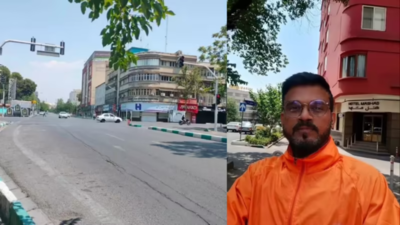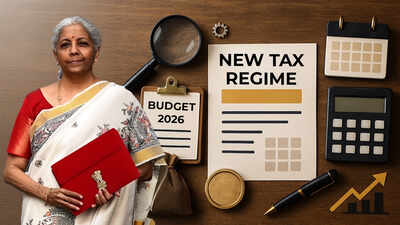‘Escaped bombs, but now I’m stuck at border’: Indian tourist trapped in war-hit Iran; shares ordeal

NEW DELHI: Falguni Dey, a Kolkata-based geography professor and amateur mountaineer, thought the worst was over when he left the chaos of Tehran behind. After a harrowing 500-km road journey through a country rattled by missile strikes and fuel shortages, Dey reached the Astara border near the Caspian Sea, hoping to cross into Azerbaijan and board a flight from Baku to India.But what awaited him was another stretch of uncertainty — marked by red tape, emotional exhaustion, and a prolonged wait for a migration code he never knew he needed.“I may have managed to escape the bombs in Tehran by undertaking this journey, but now I am stuck in Iran’s Astara land border because the Azerbaijan authorities would not accept me into their country without a special migration code issued by that government, and my e-visa won’t work,” Dey said in a voice message to PTI.The college professor had been stranded in Tehran since June 12, when Israel launched airstrikes on Iran as part of Operation Rising Lion, prompting the shutdown of airspace and halting his return journey. He had arrived in Iran on June 6 to attempt a summit of Mount Damavand but had to abandon his climb due to a snowstorm.By June 17, with no flights available and a growing sense of fear, he decided to escape by road, eventually reaching Astara.But the hope he carried with him was quickly replaced by despair.“Despite my best persuasions, I have been told that it would require at least another fortnight for that code to arrive, and I have no idea how I will survive that long in Iran,” he added, his voice cracking.With no access to Azerbaijan without the special code, Dey’s journey to safety — and a pre-booked hotel room in Baku — has been indefinitely delayed. The Mumbai-bound flight from Baku that he had booked is now cancelled, along with the hotel reservation made by his family in Kolkata.“No one told me in Tehran that my e-visa wasn’t sufficient to cross over to Azerbaijan by land and that I also need this special migration pass code, especially in a war situation like this,” Dey said. “I wasted no time in starting the application process… but the authorities have responded to me over email stating the process would require a minimum of 15 days.”As he watches other foreigners cross over with ease, Dey said Indians like him are being asked to wait for the migration code, making the situation even more isolating. “There’s a long queue of foreigners over here, and they are having all sorts of visas… But Indians like me have been told that possessing the migration code is mandatory for us to cross.”Though exhausted and facing a growing financial crunch, Dey remains thankful for the help he’s received — both from his homeland and strangers along the way. “The vice chancellor of Calcutta University, Santa Dutta, is in constant touch with me. So is mountaineer Debasish Biswas. A senior officer from the Indian embassy’s cultural wing in Tehran, Balaram Shukla, is also helping me out.”Indian embassy officials in Tehran and Baku are reportedly working in coordination to convince Azerbaijan to allow Dey passage given the emergency situation.His 500-km drive from Tehran to Astara was filled with its own set of challenges. With fuel caps in place across Iran, the driver — a local woman from the travel agency had to stop frequently for fuel and basic needs. “They were kind and deeply human. They even brought me fruits and tea, and stayed at the terminal to ensure I was safe.”With no certainty of when the migration code will arrive, Dey is now considering a gruelling eight-hour journey to Armenia’s border, in the hope of finding a faster route out. But the emotional and physical toll is wearing him down.“I am physically and emotionally drained… The uncertainty of reaching home is killing me. All my efforts and the money spent by my family and friends to get me to safety seem to have come to nought,” he said.For now, Falguni Dey’s journey — which began with the hope of scaling a peak — has turned into a fight for survival, fuelled by the goodwill of strangers and the prayers of loved ones.
24×7 control room helpline numbers
Phone numbers to contact the control room – 1800118797 (toll-free), +91-11-23012113, +91-11-23014104, +91-11-23017905, +91-9968291988 (for WhatsApp) – e-mail ID (situationroom@mea.gov.in).




